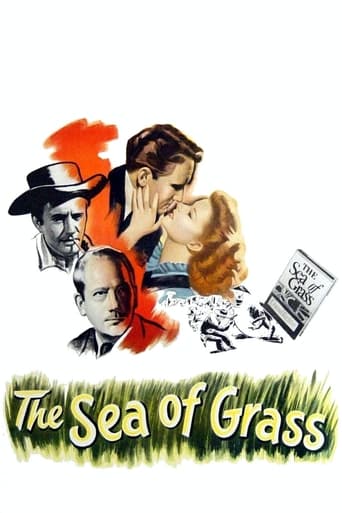wes-connors
In 1880 St. Louis, well-dressed socialite Katharine Hepburn (as Lutie Cameron) prepares for her fancy wedding to well-heeled rancher Spencer Tracy (as James "Jim" Brewton), but he is delayed due to business concerns. Traveling to New Mexico, Ms. Hepburn is hitched to Mr. Tracy after meeting his mutually attractive rival Melvyn Douglas (as Brice Chamberlain). This "love triangle" eventually produces wild Robert Walker (as Brock). Well-respected director Elia Kazan practically disowned this film; it's easy to see why, with Tracy and Hepburn appearing out of place in a decades-spanning, overblown pseudo-western soap opera epic. The reported effort to make Tracy appear sober and Hepburn appear glamorous was successful, at least. A thick layer of MGM production gloss doesn't enhance the story as much as it does the watching.***** The Sea of Grass (2/26/47) Elia Kazan ~ Katharine Hepburn, Spencer Tracy, Robert Walker, Melvyn Douglas
maryszd
I tuned into this film on TCM expecting to see a familiar prairie epic about Katherine Hepburn and Spencer Tracy fighting the heroic fight against the elements. What I got was a film about two flawed and vulnerable human beings who made a series of disastrously bad personal and parental decisions. Even though there was a lot of talk about Col. Brewton's (Tracy) attachment to the "grass"and being a cattleman, the story of the Brewton's failed marriage could have taken place in Baltimore. It was nice to see both Hepburn and Tracy acting in flawed ways and out of character. From the looks of it, Tracy was uncomfortable in the role. But Hepburn is the better actor here and her predicament is more poignant. It's an odd and interesting film that's well worth seeing.
moonspinner55
Young woman in 1880 St. Louis marries a cattle-baron who wields a powerful, occasionally unpopular and unfeeling hand. The couple settles into their New Mexico ranch-house, where she soon has a child, but the days and weeks of loneliness get to her and she shares in a flirtation with the smitten local attorney. Conrad Richter's novel becomes somewhat misbegotten vehicle for Spencer Tracy and Katharine Hepburn, though the stars do make valiant attempts to lend believability to these characters. Richter's story is full of stop-and-start melodrama, which nearly sabotages the central relationship (particularly since screenwriters Marguerite Roberts and Vincent Lawrence have given all the best dialogue exchanges to the supporting players, many of whom ultimately fare better than the leads). Melvyn Douglas works very simply with Hepburn and they have an easy rapport; Robert Walker (as the grown son Douglas fathered with Kate) brings along a nice swagger; Edgar Buchanan (as the cook) and Harry Carey (as the local doctor) have seldom been so endearing. It's difficult getting a handle on Tracy's reserved, unimpressed Colonel. Blank-faced and slack jawed, Tracy puts a great deal of thought into this complicated man but walls himself up from the audience in the process. Hepburn, in her early scenes, radiates nervous warmth and good will, but turning her into a black-wearing drudge filled with regrets was probably a mistake. Overlong, not particularly satisfying...yet the film has something. It's handsomely-made, reasonably well-paced and is certainly unusual coming from this high-powered star-duo. **1/2 from ****
MartinHafer
This movie is tough to love. Partly this is due to the setting of the film (nothing but grasslands as far as the eyes can see), but most of it is because the two main characters are so flawed and unlikable. In some ways this unlikability is good, as too often Hollywood films of the 30s and 40s present people in a "black/white" fashion and people who fall somewhere towards the middle are seldom seen. However, such "gray" characters are tough to bond with or care about, so I can understand why the film makers generally avoided this. Katherine Hepburn seems like a good character through much of the film, but midway through it, she shows a self-centeredness that make it tough to really see the tragedy in her life. Her initially living with the cruel and lawless Tracy is unforgivable, but her having an affair and then leaving her kids (one the bastard) with Tracy and not seeing them for almost 20 years make her very, very tough to like. Tracy, on the other hand, does stay to care for his kids--but in a very self-serving fashion. He is an emotionally constricted and yet over-indulgent father. As a human being, he's a lot worse--killing or nearly killing farmers because he saw the plains as his own personal property. The central message that eventually these farmers contributed to the destruction of the plains is lost--Tracy's not fighting against the farmers due to any love of nature or a desire to preserve the land. No, he's just a greedy rancher that will do ANYTHING to keep the land without fences.Despite the problems with the characters, the film is exquisitely filmed--with some of the more beautiful camera shots I've seen in a long time. This film is worth seeing, but not one I would recommend you rush to see.



